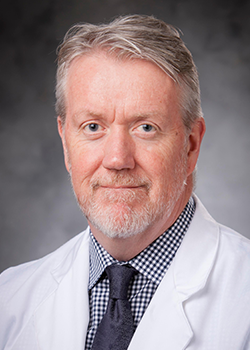
Can Scientists Learn to Prevent Brain Tumors?
By Angela Spivey
David Ashley, PhD, FRACP, MBBS, the Rory David Deutsch Distinguished Professor of Neuro-Oncology and director of the Preston Robert Tisch Brain Tumor Center at Duke, calls his choice to focus his career on brain cancers "a compulsion to defeat this terrible problem."
"When I was 23 years old, my father died of a very nasty cancer," Ashley said. He was an intern just starting his residency at the time. "I had dreams of becoming an infectious diseases doctor, but something triggered in me with his death to change to cancer," he said. "And clearly brain tumors were the very worst type of cancer."
Today, Ashley and his research team have taken a step in the direction of defeating brain tumors before they ever start.

Some background: Ashley's laboratory has been studying a protein called STING (stimulator of interferon genes) that normally detects DNA damage and sends out signals so the immune system can repair it. They found that this pathway is turned off in brain tumors.
"So brain tumors are forming in an environment that is devoid of the capacity for immune detection. If we can switch these pathways back on in brain tumors, that may form the basis of a therapy," Ashley said. The team tried it in cell lines from human brain tumors and found that a drug that is used to treat myelodysplastic syndrome and acute myeloid leukemia can switch this pathway back on. These results were published in 2021 in Cancer Cell.
In addition to being turned off in adults with brain tumors, that DNA-damage-detection pathway is also switched off during normal fetal development. So Ashley's team wondered if brain tumors are taking advantage of other mechanisms that are meant to operate only before a baby is born.
That led them to form a collaboration with a group in Norway that is expert in whole genome sequencing and other newer genomic technologies and computational methods, to look for the "cell of origin" for brain tumors. "Certain genes switch on and switch off as the cells in the brain mature and make connections," Ashley said. "But there's a particular type of cell that's actually meant to disappear. It's not even meant to exist in the human adult brain. And when we look at that cell, it looks very much like a glioblastoma."
By studying human fetal atlases and brain tumor tissue, the team found evidence that this cell is the "seed cell" that initiates glioblastomas, which are fast-growing and aggressive and are the most common primary brain tumor.
"This implies that the earliest steps in forming a glioblastoma are occurring when patients are a still- developing fetus," Ashley said.
If the researchers confirm these findings, and they could develop a non-invasive test such as a blood test to detect this seed cell in babies, that would be a clue that those babies are at risk for a brain tumor later in life.
"We think the key is that the fetal cells are persisting in adults," Ashley said. "And if we could detect these fetal cells in people at risk, it's conceivable that we could prevent brain tumors by developing medications to prevent the cells of origin from progressing."
To build the foundation for that vision, the researchers will next aim to detect these origin cells in the brains of deceased brain tumor patients, then look for them in the brains of deceased people without brain tumors who have donated their brains for research. The brain tissue is available through a collaboration with the Department of Defense, Ashley said.